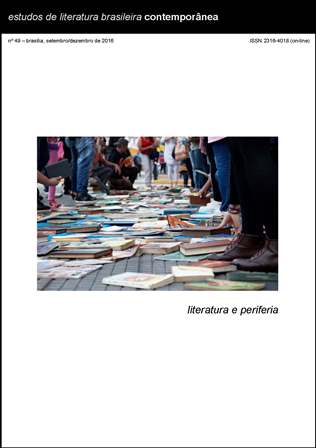Cíntia Moscovich e Carol Bensimon:
a lésbica na literatura brasileira contemporânea
DOI:
https://doi.org/10.1590/2316-40184914Abstract
Este artigo pretende apresentar uma análise das personagens homossexuais femininas nas obras Duas iguais, de Cíntia Moscovich, e Todos nós adorávamos caubóis, de Carol Bensimon. Para tanto, apresenta um breve levantamento das abordagens presentes na literatura brasileira, do Barroco ao Modernismo, a partir do viés do amor entre mulheres. Ao realizar a comparação das duas obras contemporâneas com as obras antigas, busca-se compreender como se dá a representação da personagem homossexual feminina e o quanto essa representação foi se modificando ao longo dos anos no Brasil.
References
ALÓS, Anselmo (2010). Narrativas da sexualidade: pressupostos para uma poética queer. Revista de Estudos Feministas, Florianópolis, v. 18, n. 3, p. 837-864, set./dez.
BENSIMON, Carol (2013). Todos nós adorávamos caubóis. São Paulo: Companhia das Letras.
DABHOIWALA, Faramerz (2013). As origens do sexo: uma história da primeira revolução sexual. São Paulo: Globo.
DALCASTAGNÈ, Regina (2012). Literatura brasileira contemporânea: um território contestado. Vinhedo: Horizonte.
FOUCAULT, Michel (1992). A ordem do discurso. São Paulo: Loyola.
MOTT, Luiz (1987). O lesbianismo no Brasil. Porto Alegre: Mercado Aberto.
MOSCOVICH, Cíntia (2004). Duas iguais. Rio de Janeiro: Record.
RESENDE, Beatriz (2008). Contemporâneos. Rio de Janeiro: Casa da Palavra.
RIOS, Cassandra (1983). Eu sou uma lésbica: vamos brincar de gatinho? Rio de Janeiro: Record.
TREVISAN, João Silvério (1986/2007). Devassos no paraíso: a homossexualidade no Brasil, da colônia à atualidade. Rio de Janeiro: Record.
Downloads
Published
Issue
Section
License
Authors who publish in this journal agree to the following terms:
a) The authors maintain the copyright and grant the journal the right of first publication, the work being simultaneously licensed under the Creative Commons Attribution License-Non Commercial 4.0 which allows the sharing of the work with acknowledgment of the authorship of the work and publication this journal.
b) Authors are authorized to enter into additional contracts separately, for non-exclusive distribution of the version of the work published in this journal (eg publish in institutional repository or as a book chapter), with authorship recognition and publication in this journal.
c) Authors are allowed and encouraged to publish and distribute their work online (eg in institutional repositories or on their personal page) after the editorial process, as this can generate productive changes, as well as increase the impact and citation of published work (See The Effect of Free Access).
d) The authors of the approved works authorize the magazine to, after publication, transfer its content for reproduction in content crawlers, virtual libraries and the like.
e) The authors assume that the texts submitted to the publication are of their original creation, being fully responsible for their content in the event of possible opposition by third parties.


